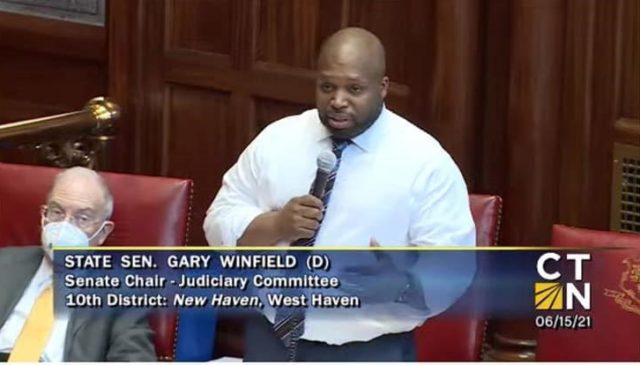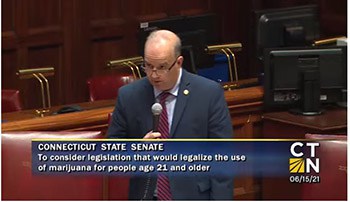
Social equity has been a pillar for adult-use cannabis passage among many state legislatures that have recently adopted public policy to end prohibition. But language surrounding social equity applications and funding may be the demise of legislation in Connecticut.
The Connecticut Senate passed an adult-use bill by a 19-12 vote during special session June 15, a week after the upper chamber passed the legislation with the same number of yeses during its regular season.
Threats of a House Republican filibuster on the final day before the Legislature adjourned June 9 sidelined the legislation, prompting Gov. Ned Lamont to call the special session.
RELATED: Clock is Ticking for Adult-Use Cannabis Bill in Connecticut
While Lamont supports adult-use legalization—he proposed it during his February state budget request—the governor vowed to veto the new bill, Senate Bill 1201, over language involving social equity eligibility rules adopted through Amendment A in Tuesday’s special session.
Paul Mounds, the Democratic governor’s chief of staff, said in a statement that the current version of the bill “does not meet the goals laid out during negotiations when it comes to equity and ensuring the wrongs of the past are righted. To the contrary, this proposal opens the floodgates for tens of thousands of previously ineligible applicants to enter the adult-use cannabis industry.”
Specifically, the amendment would allow those with previous drug arrests or convictions a better chance to enter the state-legal cannabis industry through winning social equity licenses made available through the bill.
In his opening remarks Tuesday, Democratic Sen. Gary Winfield, who co-chairs the Joint Judiciary Committee, laid out the framework of Amendment A.
“[The amendment deals] with an issue that was in the definition of [a] social equity applicant, where some people believe that you might not allow for people who have found themselves in our prisons, for actions they had taken during the prohibition of cannabis, to participate,” he said. “It clarifies that. It is an amendment that I think helps to make this bill a better bill.”
In other words, individuals who have paid their debt to society through a prison term or other court orders, or those who have had their records expunged, would be eligible to receive a social equity license.
Among other revisions, the amendment also allows for community service in the place of a fine for those who are indigent; bans elected officials from participating in the cannabis industry laid out in the bill for two years after leaving the General Assembly; eliminates the study of home grows and instead moves forward with home grows (three mature and three immature plants); and requires tetrahydrocannabinol (THC) labels to include the content of products.
Republican Sen. John Kissel, who spoke for roughly 90 minutes in opposition of the underlying bill during last week’s regular-session debate, supported this week’s changes in Amendment A, which passed in a 26-4 vote. Notably, Kissel said he’s a proponent of the amendment’s provision to place a two-year restriction on state lawmakers from entering the industry following the time they leave office.
“From the 30,000-foot mark, I think a lot of the provisions in the amendment move the bill in a positive direction from my perspective, even though I don’t support the legalization of [adult-use cannabis],” Kissel said.

Connecticut Network | ct-n.com
Republican Sen. Dan Champagne, who voted against the amendment, said he didn’t support the social equity applicant language because he doesn’t think people with previous cannabis-related arrests or convictions should be given favorable opportunities over the rest of the state’s 3.6 million people to receive licenses to enter in the industry.
Champagne said he views “equitable” as fair and impartial.
“I’m looking at this as, you know, when arrests are made, arrests are made for people that do something wrong,” he said. “Whether people today say that it wasn’t viewed as something wrong, it doesn’t make a difference. At the time, this legislative body basically made laws and those laws were enforced, and people got arrested.
“We should never give somebody a leg up on a job. We should make sure we treat people as equals.”
According to the bill’s text, nearly half of the state’s licenses to cultivate and sell cannabis would be granted to social equity applicants (or those who reside in neighborhoods adversely impacted by the war on drugs).
Social equity licensees would also receive a 50% discount on license fees for the first three years of renewals.
The bill sets aside a portion of the licenses for social equity “to deal with the fact that we have policy that has affected these communities in ways that I don’t think any of us want our communities to have ever been affected and allows for them to get into the program that we would have,” Winfield said “There are many people that, no matter what you do, who will have a greater chance in participating in this system than any of us. And particularly, communities of color that have been operated upon because of the way we’ve chosen to operate in this state for many years.
“And, so, I see this as a conversation on equity, where some people will say, ‘Well, you’re getting more than I’m getting.’ That’s not what the conversation is about. The conversation is about the fact that some things have happened, and you have to go back and deal with the fact that they’ve happened. And that doesn’t mean equal—it means equitable.”
After the amendment was passed, Champagne said he also opposed the portion of the main bill dealing with taxes generated from adult-use cannabis sales, from which 65% would go toward social equity, 25% to drug rehabilitation and 10% to the state’s general fund. A Social Equity Council would oversee appropriations for the 65% portion of the taxes, which Champagne said he had concerns with because only two of 15 appointments for that council would come from Republicans.
Instead, that money should be allocated through the budget process by the Legislature—from the general fund—and not an outside group, he said.
“I would consider this not bipartisan on the makeup of this committee,” Champagne said. “And they’re responsible for 65 percent of the income coming off the marijuana tax, which is millions of dollars.”
With S.B. 1201 passing the Senate, the House members are scheduled to take up the legislation during the second day of the special session, June 16.
